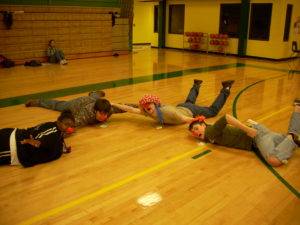Playwrighting is about creating a means for people to empower themselves, grow, explore, find joy, and reach out to a larger community through theatre. Without even meaning to, the best and best intentioned of us shape content, form, and process direction to our understanding and comfort level. This process is one more attempt to get away from “colonialism” style thinking (Marino, 1997) where the facilitator or director reproduces the imbalance of power as well as his or her own belief system in the very group that is supposed to be expressing themselves.
Since we want to encourage responsible citizenry and a dedication to democratic process, we, too, need to be more interrogative and exacting with regard to ourselves as facilitators and teachers, rather than reproducing the views, the dominant belief system, or the psyche of the facilitator. That is not to say that the facilitator should not give her opinion. The facilitator may be speaking from a wealth of experience.
Instead, the facilitator should seek to monitor herself in three main ways:
1) Creating an empowering ensemble environment
2) Taking three steps back
(a) from declarative statements/opinions
For example, I check myself before I make a comment about a structure idea or character relationship with “What were the open questions I asked myself to arrive at this answer?” NOTE: this is NOT the same as “What could I ask to get the group to arrive at MY answer?” Indeed, I often find that the group has a much different and very workable solution. Sometimes this is based in cultural differences, other times in the perspective of the value of things that varies among people of differing ages. Once, a group of fourth graders wrought a play that had a spelling bee scene in it, complete with clever and funny misspellings. It was long, and my peers counseled me to cut it. I didn’t because the kids felt so strongly about it—and they were right. During the in-school presentations, that scene, out of all the performances that day, was the only one that held its audience absolutely spellbound. Ripples of hushed worry and excitement intermingled with great hilarity at silly spellings and moments of silence in which 200 kids in a cafeteria were holding their breath. We adults had forgotten, of course, that the kids don’t really know how to spell all of these words, and that the stress and trauma of a spelling test (particularly an “out-loud-in-front-of-everyone” test!) are a major part of their lives, equivalent with our stresses of work strife.
(b) from your own process
To help myself stay on track, I ask myself questions like “Am I only letting the ‘call-outs’ talk? Am I taking into account the different learning styles and abilities? Am I rotating strategies so that everyone feels safe enough to contribute and confident they have something to give? What is the existing power structure in this group?”
3) Bounce back the power
Often groups continue to push responsibility and the power to make decisions back into the realm of the facilitator. Be on the look-out! Sometimes it comes in the form of language patterns. For example, when we are talking about building the play or brainstorming ideas, oftentimes people will say, “How are you going to show that?” or “You could do such and such for this scene” and so on. The use of the word ‘you’ is obviously a red flag; I usually diffuse with such comments as ” Good question. How are you going to show that?”, “Let’s get some starter ideas on that, then we’ll think about it and come back to it”, and “This is your piece. What do you want?” Other times I will simply interrupt after “You could-” and say “No, YOU could. Go on.”
I think in our society, that it is easier to experience learning as a facilitator when the group consists largely of adults. Many of us battle this construct. Like others, I try always to learn from my students. I think perhaps I had always been that way, but only with certain students, until I was handed a powerful life lesson.
I was a very young teacher, chock full of professional theatre training and experience. I and a student, James De Forte, were leaving a hard rehearsal, and talking about what his life would be like after his impending graduation. “When I walk into a room,” he said, “I really look at everyone, and I say to myself, ‘I will learn something from every person in this room.'” I include this thought, because it can make a big difference between people “buying you” for who and what you say you are and people sensing a disconnectedness, and then not buying into the project either. Deep listening and respect on the part of the facilitator is a must for trust building.

